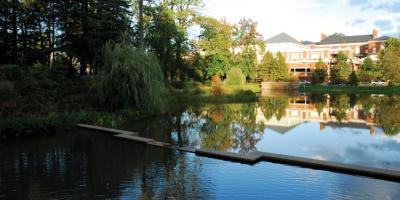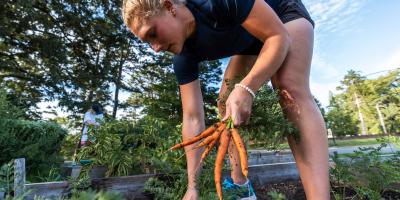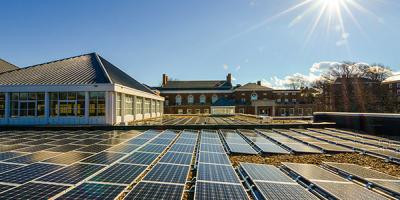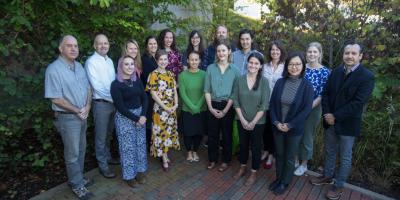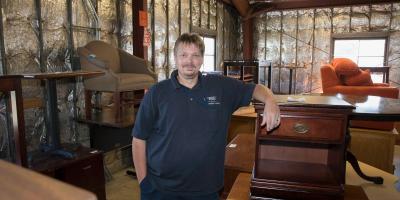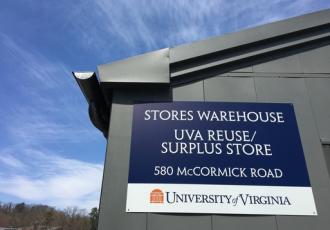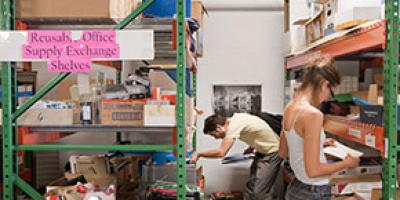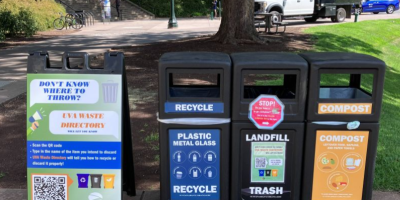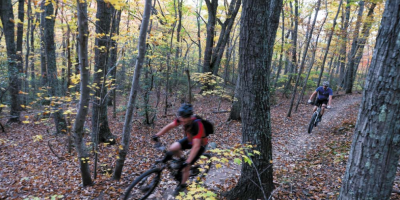If there's one thing UVA is known for, it's that learning can happen anytime, anywhere. This fall semester, we invite you to learn more about some of our 10 Bold Goals for sustainability and some lesser-known locations on Grounds that go along with them.
#1: Reduce Water by 30% - The Dell
"UVA actively pursues water efficiency and water reclamation projects to reduce water consumption and manages stormwater runoff to mitigate the impact on local waterways. We pursue water reduction by increasing water efficiency in buildings and facilities, while identifying opportunities to reclaim water that would otherwise be drained, eliminating the need for additional potable water and reducing sewer costs."
"Stormwater management is an integral part of our interaction with our environment. Increasing development and urbanization of our lands has led to changes in the natural environment including increases in flooding, degradation of water quality, erosion, and sedimentation of our waterways. The University works to reduce these impacts through stormwater management plans. To help keep Virginia's waterways clean, the University community works together to minimize pollution and litter from entering storm drains."-UVA Sustainability, Water
You might've seen a pond while walking to and from central Grounds, but most don’t know its history and impact on UVA. The Dell is located behind the University Bookstore on Emmett Street. It’s a hybrid Best Management Practice for stormwater runoff, and ever since the completion of its daylighting (restoring the stream to a more natural state) in 2003, the benefits have been seen in many ways. The most visible effects are the environmental ones: UVA has seen a decrease in flooding, and the native plants surrounding the pond (representing the three physiographic provinces) filter out iron, nitrogen, and phosphate before the water goes downstream.
The effects aren’t only environmental, though. The Dell is often a place of tranquility for students, equipped with sitting areas and a walking path, and there are hands-on learning opportunities for a wide variety of classes, including the engineering, architecture, and science departments.
#2: Increase Sustainable Food to 30% - UVA Student Garden
"From student vegetable gardens to sourcing food from local and/or Black and Brown growers for our dining facilities, the University is supporting a sustainable food system to reduce negative environmental and social impacts from agriculture, food processing and distribution while strengthening UVA’s connection within the region." -UVA Sustainability, Food
The UVA Student Garden is located between McCormick and Alderman Road and students, faculty, and community members are all welcome at any time. Anyone can tend to the harvest (no commitment, sign-up, or prior knowledge necessary), but the Student Garden does offer regular workdays (Fall 2023 workday is Friday at 9 AM) consisting of harvesting produce, watering plants, planting new seeds, and more. Even if you don't have a green thumb, feel free to sit at a picnic table and enjoy some fresh produce!
All of the produce that isn’t isn’t eaten by community members or donated to the UVA Food Pantry is composted at the garden. In addition, some of the finished compost produced from the dining halls returns to the UVA Student Garden to be used as fertilizer.
#3: Carbon Neutral & Fossil Fuel Free - Solar Panel Roofs
"While we aim to minimize energy consumption on Grounds, UVA is also seeking to procure clean, renewable energy sources to provide the power necessary to run the University."-UVA Sustainability, Energy
Although they aren’t visible to us most of the time, there are actually six buildings on Grounds with solar panel roofs: Skipwith Hall, the UVA Bookstore, Ridley Hall, Ivy Stacks, Clemons Library, and the Alderman Substation. In addition to these six, we also have two off-site solar farms. All of these solar panels have provided renewable energy for use, and our total solar power production since January 10, 2015 has been 255.83 GWh, allowing us to avoid 79.2k metric tons of CO2. For more specific, real-time data on solar energy production at UVA, you can check out this link here!
The first solar project at UVA was completed in January of 2016 on top of Skipwith Hall (which actually houses the Office for Sustainability, but we’ll get into that in more detail later). This building has 55 rooftop panels with a capacity of 15 kW, and the total solar production from this building has been 154 MWh since 2015. Unlike most of the other buildings, the solar panels on Skipwith Hall are actually visible from Ground level!
#4: Grounds-Engaged Learning - Office for Sustainability
"The mission of the Office for Sustainability (OFS) is to lead and collaborate on pan-University efforts to steward the built environment and natural resources on Grounds, engage UVA stakeholders and our local community in sustainability initiatives, and discover innovative, collaborative climate solutions for Grounds and beyond."
"OFS works with students, staff, faculty, alumni, and community members across topic areas such as climate action, environmental justice, energy efficiency and renewable energy, sustainable food, water conservation and waste reduction. The OFS team of engineers and outreach and communications specialists lead and implement a wide range of sustainability programs, events, and projects with partners across Grounds.” -UVA Sustainability, Office for Sustainability
The UVA Office for Sustainability is understandably the heart of sustainable operations on Grounds. The team consists of 18 staff members and 23 student employees. They have over 265 student volunteers that work to promote and increase sustainability. They also have a wide variety of programs, including: Building Efficiency Program, Sustainable Labs Program, Zero Waste, Eco-Leaders, and Green Athletics.
- The Building Efficiency Program funds and implements projects to reduce energy use, especially in energy-intensive buildings. They do this by upgrading lighting systems, HVAC scheduling, ventilation, pneumatic controls and direct digital controls.
- The Sustainable Labs program consists of two parts and is critical to UVA, especially considering the fact that research labs at UVA make up 13% of our physical footprint but are responsible for 33% of our energy use and that labs consume on average 10 times more energy and four times more water than office spaces. The Green Labs program works with researchers to lead energy conservation initiatives, recycling education, and more, while the Smart Labs program facilitates large-scale energy efficiency upgrades and helps to enhance safety in laboratory buildings.
- Zero Waste at UVA takes many forms. Since the mid-2010s, UVA has banned the purchase and use of certain single-use plastics. The Zero Waste Ambassador Program works to expand composting efforts around Grounds and increase knowledge around composting.
- The Eco-Leaders program is available to on-grounds students new to UVA. Eco-Leaders have the chance to learn more about sustainability via faculty connections and professional development, and they will participate in meetings, have Career Center workshops, advocate for sustainability in their dorms, and finish the program with a “Green Certification.”
- The Green Athletics program also consists of two parts: For Green Games, student volunteers join each event to help collect and monitor compost bins during and after the game, and in Green Athletics, a group of student athlete leaders work to promote sustainable practices among student athletes, coaches and administration.
#5: Reduce Waste to 30% - ReUse Store
"UVA works to reduce the environmental impacts of our operations through comprehensive programs to reduce waste and reuse and recycle materials throughout the institution to save money and resources." -UVA Sustainability, Materials & Waste
Located at 580 McCormick Rd, the ReUse Store is open Tuesday, Wednesday, and Thursday from 6 AM to 2 PM. It is open to all students, staff, faculty, and community members. The goal of the ReUse Store is to extend the life of items that would otherwise end up in a landfill, and they achieve this goal by collecting, selling, and ultimately facilitating the reuse of university-owned surplus property, regardless of the condition.
There are three types of UVA-owned surplus property that the ReUse Store accepts, which includes: computer/electronic (electronics that previously/now contain University data), office furniture (desks, chairs, tables, books, shelves, etc.) and general surplus (things like appliances and vehicles).
University-owned surplus property can be submitted to the store using the Customer Portal Surplus Request, and anyone can buy items from the ReUse Store for much cheaper. Surplus items bought for UVA business on Grounds are generally free as well.
#5: Reduce Waste to 30% - ROSE Program
"UVA works to reduce the environmental impacts of our operations through comprehensive programs to reduce waste and reuse and recycle materials throughout the institution to save money and resources." -UVA Sustainability, ROSE Program
Housed on the lower level of the ReUse Store, the ROSE (Reusable Office Supply Exchange) Program has a similar goal - keep usable materials out of the landfill. They collect gently or never-used office supplies, and from there, anyone in the community is welcome to come in and take whatever they may need. The ROSE Program has an assortment of office supplies available, including but not limited to binders, staplers, printer paper, speakers, and file organizers.
The ROSE Program is open Tuesday, Thursday, and Friday from 8 AM - 2 PM. Students can donate their surplus office supplies to the ROSE Program as well, which can be especially convenient at the end of a school year when you have lots of leftover notebook paper or binders you no longer need!
#5: Reduce Waste to 30% - Composting
"Reducing waste generated and reducing waste-to-landfill across 19.1 million square feet of facilities is not an easy task. UVA tackles this through a rigorous and multi-faceted approach including increasing recycling and composting, increasing procurement of more sustainable products and eliminating many single-use plastics." -UVA Sustainability, Plans & Progress
By now, you’ve probably seen the compost bins all around Grounds. Composting helps to eliminate food waste and reduce greenhouse gas emissions by keeping organic materials out of landfills. When compostable materials enter landfills, they don’t break down properly and create methane, which is 20 times worse than CO2. Luckily, UVA works to make sure composting is accessible and understandable. Walking along the street, you’re bound to run into a couple composting bins, each with an orange poster on top guiding what can and cannot be composted. Although not all of the dorms have access to composting, the International Residence College, Hereford College, Brown College, and the Lawn have access.
UVA works with the nearby Black Bear Composting facility, which collects food waste, uncoated paper, and certified compostable utensils. All of the dining halls compost their food waste, and they offer compostable to-go boxes, utensils, and cups as well. This compost can later be used in gardens (like our Student Garden discussed above!) as a way to reduce the need for chemical fertilizers.
Bonus - O’Hill Trails
Now that you’ve made it to the end, here’s a little treat! O’Hill Trails isn’t necessarily related to a sustainability goal, but it’s a great reminder of why we strive to be sustainable and help the environment. The trail can be used for hiking, running, mountain biking, or just a calming walk. It’s a bit tricky to find the entrance, but if you walk up McCormick Road, past Slaughter Recreation Center and the Kellogg bus stop, continue up the hill, take a right at the intersection, and stay on McCormick and continue uphill for a few minutes until you’re past some large green water tanks, you’ll see a gravel area on the left. This is one of the entrances. If that seemed confusing, here’s a navigable map you can use to find different entrances and trails.
Observatory Hill rises 865 feet on the western edge of Grounds and about 100 yards off the pavement. The trials used to be largely unmanaged, and bikers and other users would use them without regard to the environmental impact. This changed about a decade ago when UVA negotiated a memorandum of understanding with the Charlottesville Area Mountain Bike Club (CAMBC). CAMBC maintains the trails for UVA, with an emphasis on preventing erosion and other adverse impacts. They have also opened new trails, and the most recent one is near Kellogg House (directions provided above).

